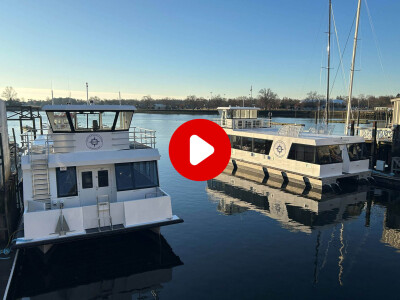With Massachusetts moving faster toward offshore wind energy, a national coalition of commercial fishing groups this week urged state officials to limit a first project to no more than 400 megawatts, and set up a new system for the seafood and offshore wind industries to jointly plan a way forward.
“We are pragmatic and we understand that we do not ‘own’ the ocean where these wind farms are being sited,” the National Coalition for Fishing Communities wrote in an April 9 letter to Massachusetts Gov. Charles D. Baker Jr.
“But we do not believe that a renewable resource like wind energy should be allowed to displace another renewable resource like wild fisheries. To guard against that outcome, a measured, restrained approach to the initial project size is best,” the letter stated. “It is irresponsible to allow construction of sizable wind farms without a deep understanding of their impacts.”
This month Massachusetts officials are looking to select an offshore wind development proposal to fit their plans for adding more renewable energy sources to the state’s power mix. The ill-fated Cape Wind plan to build turbines in Nantucket Sound was defeated by strenuous local opposition to siting in nearshore waters, and now proposals are over the horizon on federal offshore leases.
Deepwater Wind, builder of the first U.S. pilot project with five turbines in Rhode Island state waters off Block Island, is among the contenders in Massachusetts with its planned Revolution Wind project south of Martha’s Vineyard. That proposal is for 400 MW and Deepwater Wind officials say they will build the turbine foundations, crew transfer vessels and offshore service vessels in Massachusetts shipyards.
That could mean serious money for Massachusetts’ maritime industry, and state and New Bedford city officials have been working for years to position the fishing port to be a hub for offshore wind energy development. The fishermen’s coalition letter — signed by owners of more than 200 fishing vessels and seafood companies from Maine to Virginia — calls for the New Bedford Port Authority to “take on a leadership position as the central facilitator of communication between the two industries for all offshore wind projects in development in the Massachusetts Wind Energy Area (WEA).”
“This could potentially grow into a role as central facilitator for other wind projects in development along the Northeast seaboard where commercial fishing impacts are anticipated,” the coalition suggested, and “can only serve to benefit the interests of both the fishing and offshore wind industries. The NBPA has the technical expertise and the credibility within our community that is essential to effective communication and problem-solving among stakeholders.”
Bay State Wind and Vineyard Wind also hold federal leases granted by the Bureau of Ocean Energy Management south of Martha's Vineyard, and collectively the three companies propose building arrays producing up to 1,100 MW. The fishermen’s coalition urged Gov. Baker to go slow, and in a Tuesday meeting with editors at the New Bedford Standard-Times he assured that fishermen will have a substantial voice in the process.
The fishing groups say there is a lack of coordination and communication between them and the developers, and they propose a standardized framework for examining how the projects will affect fisheries. It is not enough to extrapolate experience with wind farms in Europe to U.S. waters, and Massachusetts should set a more modest goal of 400 MW for starting its industry and studying the effects, they say.
“Even if a smaller wind project is approved, there is not currently a process or plan in place to measure its varied impacts on the fishing industry,” although there are BOEM guidelines that require developers to consider study fisheries impacts, the fishing group wrote. “The problem lies with what the BOEM guidelines lack. For example, there is no framework for deciding who will perform the studies to ensure their rigor and credibility; and nothing to ensure that studies even take into account input from the fishing industry.”
With a reset of relations between the industries, there can be “a constructive environment where project plans and information about operations are shared with the fishermen, where issues in need of attention are articulated back to the wind developers, and where potential conflicts are diffused and problems solved,” the group wrote.




.jpg.small.400x400.jpg)
